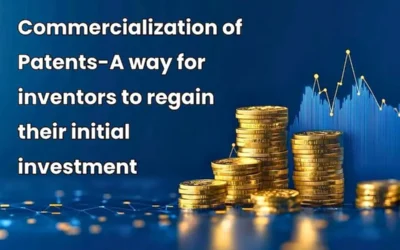
Patents have become one of the most valuable assets for major companies. Large companies have long used the power of patents to strengthen their market positions and generate long-term revenue through patent commercialization for startups, the process of turning intellectual property into profit. Methods such as patent selling, licensing and pooling have enabled these giants to maximize the financial potential of their innovations. However, when it comes on patent commercialization for startups and MSMEs, a crucial question arises: Can smaller companies also benefit from patent monetization as well? The answer is yes, but it requires the right strategy, planning, and understanding of the global IP ecosystem. Keep reading to understand how start-ups and MSMEs can benefit from patent monetization in India.
How Can Patents Help Start-ups and MSMEs Grow Globally?
Before knowing about the benefits of patent commercialization for startups and MSMEs, it is essential to understand how patent monetization works in India. Patent monetization refers to the process by which a patent holder grants rights to another party to use, manufacture, or sell the patented technology in exchange for financial returns. In simple terms, it’s about converting intellectual property into income.
There are many methods/ways to monetize patents in India, such as:
- Patent Selling
- Patent Licensing
- Patent Pooling
- Patent Disputes or Litigation, etc.
These methods have long been used successfully by large corporations; the real challenge lies in how smaller companies, start-ups, and MSMEs can effectively use the patent monetization method to their advantage.
For small companies, patent monetization may seem harder due to limited resources, but with the right strategies, it can become a powerful revenue source.
- Start-ups and MSMEs can begin by identifying their most valuable patents and exploring licensing opportunities with larger firms or industry partners who can commercialize the technology at scale.
- They can also sell non-core patents to generate immediate funds or join patent pools to collectively license their technologies with others, increasing visibility and reach.
- Additionally, small companies should actively monitor potential infringement and, when necessary, pursue legal enforcement or settlements to protect their rights. By strategically managing and monetizing their IP assets, even small businesses can turn innovation into sustainable income and growth.
Read Also: Why patent monetization platforms matter for company growth in India?
What Are the Benefits of patent commercialization for startups and MSMEs?
For start-ups and MSMEs, patent monetization offers a powerful opportunity to convert innovation into income and growth, such as:
- By licensing, selling, or pooling their patents, small companies can create additional revenue streams without the need for large-scale production or heavy capital investment.
- It allows them to expand into new markets through partnerships with larger organizations.
- Monetized patents attract investors, as they represent the company’s ability to leverage intellectual property for profit and sustainability.
- The revenue earned can be reinvested into research and development, creating a self-sustaining cycle of innovation.
- Moreover, monetization helps recover R&D costs, reduces the financial burden of maintaining unused patents, and strengthens the company’s competitive position by restricting competitors’ access to similar technologies.
- Overall, patent monetization empowers start-ups and MSMEs to turn intellectual property into a strategic business asset, driving long-term growth, recognition, and financial stability.
Conclusion
Patents are far more than legal protections — they are powerful business assets that can drive innovation, revenue, and global growth. For start-ups and MSMEs, understanding and utilizing patent monetization can open new doors to funding, partnerships, and market expansion. By strategically managing their intellectual property rights through licensing, selling, or collaboration, small companies can compete with larger players and turn their ideas into profitable ventures. In today’s knowledge-driven economy, the true value of innovation lies not just in creating it, but in commercializing it wisel.









